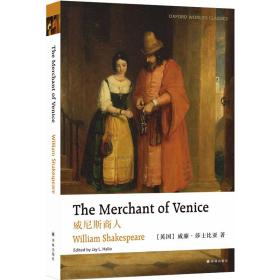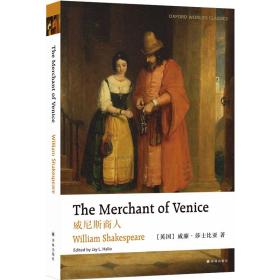
牛津英文经典:威尼斯商人
全新正版 极速发货
¥ 10.35 3.2折 ¥ 32 全新
库存3件
广东广州
认证卖家担保交易快速发货售后保障
作者威廉?莎士比亚
出版社译林
ISBN9787544783088
出版时间2020-08
装帧其他
开本其他
定价32元
货号30942672
上书时间2024-05-25
- 最新上架
商品详情
- 品相描述:全新
- 商品描述
-
导语摘要
“牛津英文经典”(OxfordWorld’sClassics)为牛津大学出版社百年积淀的精品书系,译林出版社原版引进。除牛津品牌保证的quanwei原著版本之外,每册书附含名家导读、作家简介及年表、词汇解析、文本注释、背景知识拓展、同步阅读导引、版本信息等,特别适合作为大学生和学有余力的中学生英语学习的必读材料。导读者包括牛津和剑桥大学的资深教授、知名学者。整套书选目精良,便携易读,实为亲近名著的经典读本。
《威尼斯商人》是莎士比亚创作于1596—1597年的一部五幕喜剧,1598年首次演出,1600年出版。剧中的高利贷商人夏洛克、乔装律师的鲍西娅已成为经典莎剧角色,优秀演员历来用来挑战、超越自我。时至今日,这部作品蕴含的商业、法律、伦理问题仍然被广泛讨论。
作者简介
威廉·莎士比亚(1564—1616),英国文艺复兴时期伟大的剧作家、诗人,欧洲文艺复兴时期人文主义文学的集大成者,全世界最卓越的文学家之一。英国戏剧家本·琼森称他为“时代的灵魂”,马克思称他与古希腊的埃斯库罗斯为“人类最伟大的戏剧天才”。
莎士比亚流传下来的作品包括38部剧本、154首十四行诗、两首长叙事诗和其他诗作。其中代表作主要为诗剧:《李尔王》《哈姆莱特》《奥赛罗》《罗密欧与朱丽叶》《威尼斯商人》等。他的作品是人文主义文学的杰出代表,在世界文学史上占有极重要的地位。他的作品直至今日依旧广受欢迎,在全球以不同文化和政治形式演出和诠释。
目录
Contents
List of Illustrations
General Introduction
Shakespeare and Semitism
Sources, Analogues, and Date
The Play
The Merchant of Venice in Performance
Textual Introduction
Editorial Procedures
Abbreviations and References
THE MERCHANT OF VENICE
APPENDIX
Speech prefixes for Shylock in Q1, Q2, and F
Index
内容摘要
威尼斯青年巴萨尼奥为了向富有的鲍西娅求婚,向朋友安东尼奥借款。由于安东尼奥的资金都投在了海上的货物,只好向高利贷商人夏洛克借钱。夏洛克长期不满安东尼奥,于是在借款条约中规定如果安东尼奥不能按时还款,则要从他身上割下一磅肉。巴萨尼奥求婚顺利,但是安东尼奥却无力还款,即将面临生命危险。于是,鲍西娅乔装为律师,用精彩的辩护为他们解了围。
“牛津英文经典”版本《威尼斯商人》的编者、导读撰写者为莎剧研究专家、美国特拉华大学英语系教授杰伊?L.哈利奥,文字版本从现存各版本中精选加工,采用现代英语拼写断句,每一页均附有词汇、内容解析,拥有完整索引可查,是适合学生、演员和大众读者的优良版本。
精彩内容
ANYapproachtounderstandingShakespeare’sTheMerchantofVeniceinevitablyincludesadiscussionofthevexedquestionofitsallegedanti-Semitism.ThisIntroductiontotheplaythereforeconfrontsthequestiondirectly,focusingonthebackgroundagainstwhichtheplaymustbeconsideredandacomparisonwithanotherplayfamous,orinfamous,foritsportrayalofaJew,Marlowe’sTheJewofMalta.FromthenceadiscussionoftheMerchant’smoreimmediatesourcesanditsdatacontinues,followedbyadetailedanalysisoftheplayitself,whichemphasizesitsambiguities,inconsistencies,andinternalcontradictions.Thisdiscussionnaturallyleadsintoasurveyoftheplay’sperformancehistory,particularlyitsrepresentationofthedominantcharacter,Shylock,andthemajorwayshehasbeenportrayed.TheIntroductionconcludeswithadiscussionofthetextandtheeditorialproceduresfollowedinthisedition.ShakespeareandSemitismShakespeare’sattitudetowardJews,especiallyinTheMerchantofVenice,hasbeenthecauseofunendingcontroversy.Recognizingtheproblem,intheStratford-upon-Avonseasonof1987theRoyalShakespeareCompanyperformedTheMerchantofVeniceback-to-backwithaproductionofMarlowe’sTheJewofMalta.TheJewofMalta,playedasaverybroadheroiccomedy,wasevidentlyintendedtocontrastwithShakespeare’splayanddisarmcriticism,suchastheRSChadexperiencedearlier,in1983,withalesssuccessfulproductionofTheMerchant.Toreinforcethestrategy,AntonySher,aSouthAfricanJew,wascastasShylock.Italmostworked,butnotquite.SherwaslargelyasympatheticShylock,withswastikasandotheranti-Semiticslursusedtounderscorethemoney-lenderasvictim;however,thetrailsceneportrayedShylockasextremelybloodthirsty.Interpolatingsomeextra-Shakespearianstagebusiness,borrowedfromthePassoverHaggadah,TheRSCandSherindicatedthatcuttingAntonio’spoundoffleshwastantamounttoareligiousritualofhumansacrifice.Ofcourse,nothingcouldbefurtherfromJewishreligiouspracticeorprinciples,theabortedsacrificeofIsaacinGenesis22beingthearchetypeofJewishoppositiontohumansacrifice.Intheevent,AntonySher’sShylockwasnotfarremovedfromAlunArmstrong’sBarabas.LookingcloselyatbothMarlowe’splayandShakespeare’swillclarifytheattitudestowardsSemitisminthosedramas,butthebackgroundagainstwhichbothwereconceivedisalsoimportant.JewshadbeenofficiallybanishedfromEnglandsincetheExpulsionof1290byKingEdward,buttheevictionwasnotquitethoroughgoingaswashoped.AfewJews,whetherconvertsornot,remainedinEnglandintheinterveningperiodbeforeOliverCromwellinvitedthemtoreturnintheseventeenthcentury.Thereissufficientevidenceforthisassertion,butwhetherShakespeareorMarloweactuallyknewanyJewsmaybeirrelevant.IntheirplaystheywrotenotfrompersonalexperiencebutfromatraditionthathadevolvedbothinEnglandandontheContinentoftheJewasalien,usurer,memberofaracemaudite.InMarlowe’scase,thetraditionoftheamoralmachiavelwasevenmoreimportantthanthatofthemoney-lender.Inthesepost-Holocaustdays,itmaybedifficultforustoconceivehowJewswereregardedandtreatedinEurope,includingEngland,duringtheMiddleAges.Theyhadfewrightsandcouldnotclaiminalienablecitizenshipinanycountry.Typically,theydependeduponrulersoftherealmforprotectionandsuchrightsastheymightenjoy.InthethirteenthcenturyinEngland,forexample,underHenryIIIandEdwardI,theyweretantamounttotheking’schattel.Thekingcould—anddid—disposeofthemandtheirpossessionsentirelyashechose.Heavytalladges,ortaxes,wereimposeduponJews—individuallyandcollectively—tosupportthesovereign’sfinancialneeds,andwhenthemoneyswerenotforthcoming,imprisonmentand/orconfiscationusuallyfollowed.Atthesametime,theChurchvigorouslyopposedtheexistenceofJewsinthecountry,butastheywereundertheking’sprotectiontheChurchwaspowerlesstodomorethanexcitepopularfeelingagainstthem.Contrarytocommonbelief,notallJewsweremoney-lenders,althoughusurywasoneofthefewmeanstoaccumulatesuchwealthastheyhad.ManyJewswerepoorandservedinhumble,evenmenialcapacities.Butasnon-believersinChrist,theywereadespisedpeople,howeveruseful,financiallyandotherwise(asdoctors,forinstance).Neartheendofthirteenthcentury,whenEdwardhadpracticallybankruptedhisJews,whofounditimpossibletomeethisincreasinglyexorbitantdemandsforpayments,thekingdecidedtoplayhislastcard—expulsion.ThisactwasnotsatisfyingtotheChurch,butitprovedthekingwiththelastbitofincomefromthatonceprofitablesource.SinceeverythingtheJewsownedbelongedtotheking,includingthedebtsowedthemasmoney-lendersorpawnbrokers,thekingbecamethebeneficiaryofthosedebtsaswellaseverythingelseofvalue.AlthoughEdwardrelievedthedebtorsoftheinterestontheirloansandmadesomeotherconcessions,hehopedtorealizeasizeableamountofmoneyeventually,howevermuchhemightlaterregretthetermination—forever?–orthisoncelucrativesourceofincome.Doubtless,someJewspreferredconversiontoexpulsioninEngland,aslaterinSpainundertheInquisition,andtheytookshelterintheDomusconversorum,theHouseofConverts.ThisinstitutiondatesfromtheearlythirteenthcenturyandwasaneffortbytheDominicans,assistedbytheking,toconverttheJewstoChristianity.TheDomusconversoruminwhatisnowChanceryLaneinLondonlastedwellintotheeighteenthcentury.AlthoughattimesfewifanyconvertsofJewishbirthlivedthere,inthecenturiesfollowing1290itshelteredseveralfromExeter,Oxford,Woodstock,Northampton,BuryStEdmunds,Norwich,Bristol,aswellasLondonandelsewherewhereJewshadlivedbeforebeingexpelled.AftertheExpulsion,someJewsenteredtherealmforonereasonoranother,eitherastravelersandmerchants,asrefugeesfromSpainandPortugal.
相关推荐
— 没有更多了 —




















以下为对购买帮助不大的评价